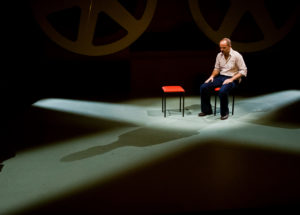Our Secrets: Life in a dystopian world.

ArtsEmerson is presenting the American début of Our Secrets, written and directed by Béla Pintér. The widely acclaimed Hungarian troupe, appropriately called Béla Pintér and company, is taking Our Secrets to New York after its short Boston run. Performed in Hungarian with supertitles, the play addresses the power that the communist state had over its citizens. It takes place in the 1980s, a period when the government encouraged its citizens to revive Hungary’s folk songs and dances as an attempt to prevent the population from falling under the influence of Western popular music. Three musicians play a variety of string instruments and a synthesizer.
The narrative revolves around a folkloric group who meet to dance and sing. One of their members is István Balla Ban (Zoltán Friedenthanal) a musicologist and a man with a secret that will interest the Hungarian intelligence service. He visits a therapist (Eszter Csákákanyi) for help with his sexuality. István is desperately attracted to his seven-year old stepdaughter Timike (Éva Enyedi) and because of this infatuation is no longer aroused by his wife. He claims that he has never done anything untoward with the stepdaughter. It is a lie. He has taught the little girl sexual games that involve his pleasure and that strangely she enjoys.
Having bugged the therapist’s office, Comrade Pánczél (Eszter Csákákanyi) head of the intelligence service, calls in István and gives him the choice between going to prison for pedophilia or becoming an informer who will be rewarded by the state. Weakling that he is, he agrees to spy on his friends. In developing István as an unhappy reprobate, Pintér casts a shadow over the society as a whole. The playwright takes this a step further by using a disconsolate would-be dancer (Szabolcs Thuróczy) in the folkloric group as István’s contact. He became a servant for the state to avenge himself on the other dancers who mocked his lack of talent.
István unwillingly keeps an eye on Imré (Béla Pintér), a close colleague in the group and an activist in charge of a “The Iron Curtain,” a secret anti-government newspaper. His protests take the form of scatological remarks about the Hungarian head of state at the period, which make the paper sound like something written by a disgruntled middle school pupil. Imré has a young son Ferenc (Angéla Stefanovics), a gifted classical pianist, who also becomes prey for István.
Although the show was billed as a “fusion of tragedy and comedy,” I saw little that was funny.
The cast of ten actors with several enacting more than one role is strong. Zoltán Friedenthanal manages to make István sympathetic, a difficult task. Béla Pintér is convincing as the rebel and also a very good dancer. The standout is Eszter Csákányl who is warm, understanding, and down-to-earth as the middle-aged therapist and slimy, needy, and evil as a short, moustachioed Comrade Panczél. The children were played by two petite young women.
Gábor Tamás’s minimalist setting is most often used as a shabby dance studio, but turns into police headquarters, apartments, a restaurant, etc. with a change of chairs, stools, and tables. Its dominant feature is an enormous reel to reel tape recorder hanging on the wall which spins much of the time. It represents both the secret service’s wiretapping and the folklorists. Laszló Tamás’s lighting adds a symbolist quality at times, particularly at the opening and closing when it seems as if we are watching a silent film from the early twentieth century.
Although the ArtsEmerson administration and Mikhail Baryshnikov could not have known where the U.S. would be politically when they went to Budapest over a year ago to arrange the production’s American appearance, it is a timely work that gives an audience much to think about.
ArtsEmerson and Béla Pinter and Company Present Our Secrets
January 19 to 22
Written and directed by Béla Pinter
Cast: Zoltan Friedenthal, Esztr Csákányi, Hella Roszik, Zsófia Szamosi, Béla Pintér, Szabolocs Thuróczy, Angéla Stefanovics, György Póta, Gábor Pelva
Musicians: Gábor Pelva, Gyorgy Póta, Hella Roszik
Dramaturg – Éva Enyedi
Costumes – Mari Benedek
Set – Gábor Tamas
Lighting – Lászlo Varga
Sound – Zoltán Belényesi